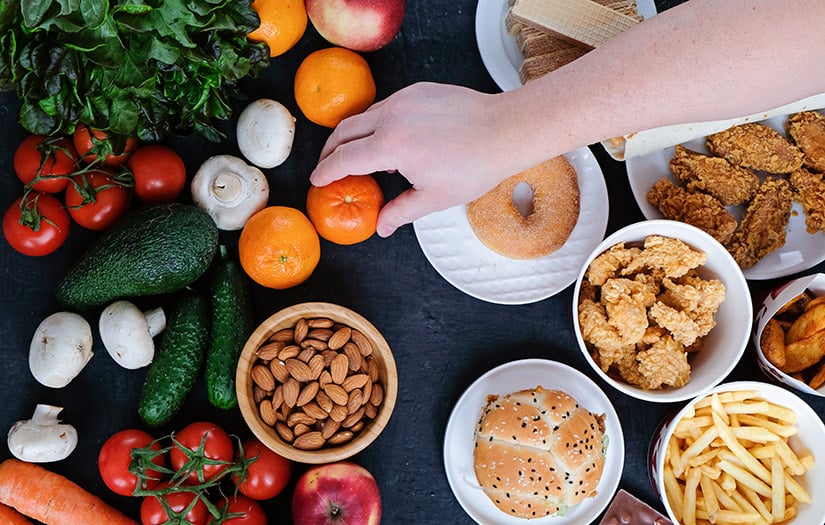Listen to your body. Understand real hunger pains. Eat when you're hungry, stop when you are full.
Have you ever heard someone say these things to you or a version of it? They were probably trying to get you to practice some form of intuitive eating.
This concept is an important perspective to consider when beginning or continuing your nutrition journey. If you are coaching clients, understanding the concept is a must.
What is Intuitive Eating?
The term was first coined in 1995 and its purpose was to help health officials teach individuals struggling with weight management, body dissatisfaction, and disordered eating patterns a way to build a better relationship with food.
The fundamental principle behind intuitive eating is that the body knows exactly how much food it needs daily to properly nourish itself and maintain an appropriate weight. However, because of certain societal cues we learn growing up (i.e., clearing your plate to have dessert) we become numb to these intrinsic signals.
Therefore, intuitive eating is the practice of listening or becoming re-aware of our intrinsic hunger cues. With intuitive eating, no restrictions are placed on the amount or type of food one can consume — unless dictated by certain medical conditions or allergies. The philosophy behind no restrictions comes from the belief the body will naturally crave a variety of nutrients.
The Difference Between Intuitive and Non-Intuitive Eating
Before we dive into what intuitive eating is, lets first touch on what it isn’t:
- Intuitive eating is not a fad diet (or any kind of diet)
- Intuitive eating is not a means to weight loss or weight management. It’s not about weight at all.
- Intuitive eating is not anti-health, anti-nutrition, anti-exercise, etc.
- Intuitive eating, while encompassing parts of mindful eating, is not just mindful eating.
- Intuitive eating is not for everyone all of the time. In fact, if you have an eating disorder, disordered eating, or a long history of dieting, it’s easy to take intuitive eating and manipulate it into something it’s not.*
Diets just do not work. Dietitians Evelyn Tribole and Elyse Resch realization of just that inspired them to research what did and write the book Intuitive Eating, with the first edition published in 1995. Since then they have released two newer editions and a workbook under the same name.
So how does one begin to practice intuitive eating? By following these 10 principles, you can start your journey on building a better relationship with food.
Explore more: Cheat Meals Explained
The 10 Principles of Intuitive Eating
- Reject the diet mentality
- Honor your hunger
- Make peace with food
- Challenge the 'food police'
- Feel your fullness
- Discover the satisfaction factor
- Cope with your emotions
- Respect your body
- Exercise
- Honor your health
#1 Reject the diet mentality
A diet implies something short-term or finite. What is one to do after the diet is over? Research has repeatedly demonstrated that individuals on any extreme weight loss program do not maintain the weight loss for significant periods.
Very often those individuals regain back the weight (or more) once they are no longer following strict guidelines. By rejecting the diet mentality, you begin to view diet changes as new lifestyle habits that you can sustain long term.
#2 Honor your hunger
Learning true hunger cues and eating when the body needs energy is key to intuitive eating. Very often individuals ignore these intrinsic hunger signals which can lead to binge eating.
#3 Make peace with food
A philosophy behind intuitive eating is that you remove all "bad" labels surrounding food. For example, claiming any high fat or sugary dessert is "bad for you". Limiting your choices can enhance cravings which can lead to uncontrollable binging later. If you want to consume a particular food, do it.
#4 Challenge the food police
This means your internal food police, not friends or family commenting on your meal choices. Internal scolding for consuming a sweet treat and claiming it threw your entire diet off for one day aren't conducive to building a better relationship with food. This principle is all about challenging negative beliefs associated with meal choices.
#5 Feel your fullness
Learn when you are truly hungry and learn when you are full. Stop consuming food when you feel you are satiated.
#6 Discover the satisfaction factor
This principle is all about being in the moment and creating an inviting, enjoyable environment when eating. By increasing mindfulness, it can help increase satisfaction and satiation.
#7 Cope with your emotions
Learn how to eat for your physical well-being and not an emotional one. The focus of this principle is to learn how to deal with emotions and not use food as a coping mechanism. Very often individuals turn to food to cope with stress and/or anxiety. Most of these food choices are often concentrated in fats and sugars which can stimulate releases in dopamine, the "pleasure" hormone.
#8 Respect your body
Respecting your body is all about acceptance of your genetic blueprint. Learn to appreciate your features and size without coming up with unrealistic goals. For example, an individual that is 5'5" can't diet or train to become 6'0". Accept your body and learn to work with it, not against it.
#9 Exercise
This principle isn't just about burning calories, it's about the movement for healthier living. Additionally, this principle encourages individuals to practice mindfulness in movement. If a particular exercise brought about positive emotions, use those emotions as the motivator to continue the activity.
#10 Honor your health
This last principle is about providing your body with the nutrients it needs. While you should not limit yourself from every indulgence, it is important to feed your body a variety of fruits, vegetables, proteins, fats, and whole grains. All essential components to a healthy, balanced diet.
Is intuitive eating a useful tool to create real changes?
Well according to the research, many studies have shown intuitive eating is positively associated with healthier eating behaviors, various psychological health indicators, and can aid in some weight loss. However, one study claimed intuitive eating does not promote increases in physical activity or is a successful tool in aiding in significant weight loss. It had more success in maintaining weight over a long period.
So, is conventional calorie restriction more useful than intuitive eating when it comes to building better dietary habits?
To reduce body weight, more energy must be expended compared to the energy consumed. Therefore, purposeful calorie restriction to lose weight would be more beneficial than following the intuitive eating paradigm.
However, in terms of health status, one study evaluated dietary patterns between college-aged dieters and intuitive eaters and found no significant differences in the number of fruits and vegetables consumed each day, calories consumed from fats, and found that most intuitive eaters either consumed their daily calorie needs or just slightly below (4).
Therefore, it was concluded in this review that intuitive eating had no effects on markers of health status when it came to food choices. This review, however, was conducted in a small college-aged population and may not serve as a useful study to compare to larger populations.
When we look at current diet culture, there is an extensive amount of misinformation and diet fads that only promise short-term success. They do not provide long-term and sustainable tips to tackle the true issues of body image dissatisfaction and poor relationships with food. In that sense, intuitive eating is a great tool to heal the psychological aspects of "diet culture".
Much of the research has shown positive correlations with body image satisfaction, lower BMIs, and less dieting and disordered eating practices. Some research even suggests that intuitive eating can be used as a tool to promote positive treatment outcomes within eating disorder clinics (5,6).
Overall, intuitive eating seems to foster positive changes in body image satisfaction and promote healthier relationships with food. While intuitive eating practices may not be the most viable solution for weight loss, it does seem to be an important tool in creating long-term success in any weight loss journey. Research has shown that intuitive eating is correlated with lower BMI's, more positive attitudes towards food, and better health outcomes since intuitive eating targets behavior and psychological change.
References
1. https://www.cambridge.org/core/journals/public-health-nutrition/article/review-article-relationships-between-intuitive-eating-and-health-indicators-literature-review/CBC03E81A54FBAAC49B2A8B2EC49631C
2. https://books.google.com/books?hl=en&lr=&id=gPGrAJWz7Z4C&oi=fnd&pg=PR9&dq=10+principles+of+intuitive+eating+scholarly+articles&ots=TkjY848xT2&sig=-e2AJaLBb0PwBOA8MjFdl5ZpEv4#v=onepage&q=10%20principles%20&f=false
3. https://www.sciencedirect.com/science/article/abs/pii/S0195666315300635
4. https://digitalcommons.usu.edu/cgi/viewcontent.cgi?article=1099&context=etd
5. https://www.tandfonline.com/doi/full/10.1080/10640266.2017.1279907?scroll=top&needAccess=true
6. https://onlinelibrary.wiley.com/doi/abs/10.1002/eat.23238

















